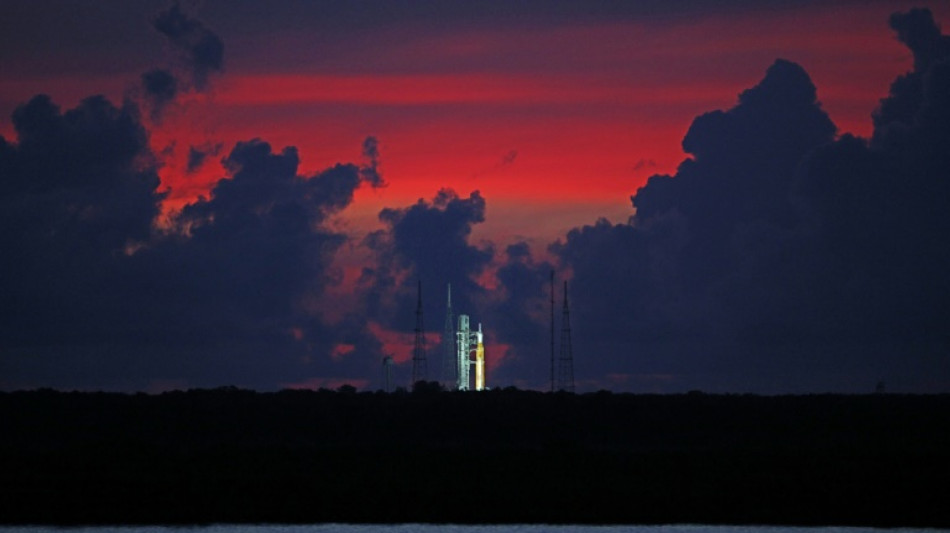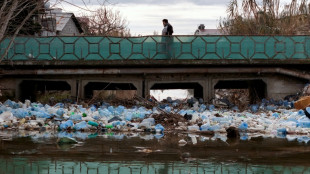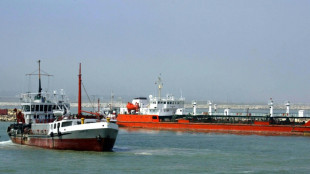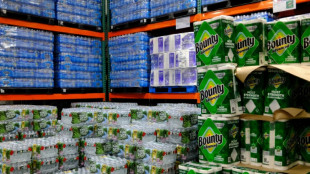
-
 Russell eager to face Scotland team-mates when Bath play Edinburgh
Russell eager to face Scotland team-mates when Bath play Edinburgh
-
Undav scores again as Stuttgart sink Frankfurt to go third

-
 Fuming French farmers camp out in Paris despite government pledges
Fuming French farmers camp out in Paris despite government pledges
-
Man Utd appoint Carrick as manager to end of the season

-
 Russia strikes power plant, kills four in Ukraine barrage
Russia strikes power plant, kills four in Ukraine barrage
-
France's Le Pen says had 'no sense' of any offence as appeal trial opens

-
 JPMorgan Chase reports mixed results as Dimon defends Fed chief
JPMorgan Chase reports mixed results as Dimon defends Fed chief
-
Vingegaard targets first Giro while thirsting for third Tour title

-
 US pushes forward trade enclave over Armenia
US pushes forward trade enclave over Armenia
-
Alpine release reserve driver Doohan ahead of F1 season

-
 Toulouse's Ntamack out of crunch Champions Cup match against Sale
Toulouse's Ntamack out of crunch Champions Cup match against Sale
-
US takes aim at Muslim Brotherhood in Arab world

-
 Gloucester sign Springbok World Cup-winner Kleyn
Gloucester sign Springbok World Cup-winner Kleyn
-
Trump tells Iranians 'help on its way' as crackdown toll soars

-
 Iran threatens death penalty for 'rioters' as concern grows for protester
Iran threatens death penalty for 'rioters' as concern grows for protester
-
US ends protection for Somalis amid escalating migrant crackdown

-
 Oil prices surge following Trump's Iran tariff threat
Oil prices surge following Trump's Iran tariff threat
-
Fashion student, bodybuilder, footballer: the victims of Iran's crackdown

-
 Trump tells Iranians to 'keep protesting', says 'help on its way'
Trump tells Iranians to 'keep protesting', says 'help on its way'
-
Italian Olympians 'insulted' by torch relay snub

-
 Davos braces for Trump's 'America First' onslaught
Davos braces for Trump's 'America First' onslaught
-
How AI 'deepfakes' became Elon Musk's latest scandal

-
 Albania's waste-choked rivers worsen deadly floods
Albania's waste-choked rivers worsen deadly floods
-
Cancelo rejoins Barca on loan from Al-Hilal

-
 India hunts rampaging elephant that killed 20 people
India hunts rampaging elephant that killed 20 people
-
Nuuk, Copenhagen mull Greenland independence in Trump's shadow

-
 WHO says sugary drinks, alcohol getting cheaper, should be taxed more
WHO says sugary drinks, alcohol getting cheaper, should be taxed more
-
Arteta urges Arsenal to learn from League Cup pain ahead of Chelsea semi

-
 Davos elite, devotees of multilateralism, brace for Trump
Davos elite, devotees of multilateralism, brace for Trump
-
Spanish star Julio Iglesias accused of sexual assault by two ex-employees

-
 Trump's Iran tariff threat pushes oil price higher
Trump's Iran tariff threat pushes oil price higher
-
US consumer inflation holds steady as affordability worries linger

-
 Iran to press capital crime charges for 'rioters': prosecutors
Iran to press capital crime charges for 'rioters': prosecutors
-
Denmark, Greenland set for high-stake talks at White House

-
 Iranian goes on trial in France ahead of possible prisoner swap
Iranian goes on trial in France ahead of possible prisoner swap
-
Cold winter and AI boom pushed US emissions increase in 2025

-
 Hong Kong activist investor David Webb dies at 60
Hong Kong activist investor David Webb dies at 60
-
Try to be Mourinho and I'll fail: new Real Madrid coach Arbeloa

-
 Vingegaard targets Giro d'Italia and Tour de France double
Vingegaard targets Giro d'Italia and Tour de France double
-
South Korean prosecutors demand death penalty for ex-leader Yoon

-
 Iwobi hails Nigerian 'unity' with Super Eagles set for Morocco AFCON semi
Iwobi hails Nigerian 'unity' with Super Eagles set for Morocco AFCON semi
-
Le Pen appeal trial opens with French presidential bid at stake

-
 Iran ex-empress urges security forces to join protesters
Iran ex-empress urges security forces to join protesters
-
Sudan 'lost all sources of revenue' in the war: finance minister to AFP

-
 Freezing rain hampers transport in Central Europe
Freezing rain hampers transport in Central Europe
-
Nuuk, Copenhagen cautiously mull Greenland independence

-
 'Proving the boys wrong': Teenage racers picked for elite driver programme
'Proving the boys wrong': Teenage racers picked for elite driver programme
-
Mbappe absent from training as Arbeloa takes charge at Real Madrid

-
 Iran worries push up oil price as world stocks diverge
Iran worries push up oil price as world stocks diverge
-
Volvo Cars pauses battery factory after fruitless partner search

| RBGPF | 1.13% | 82.5 | $ | |
| RYCEF | -0.06% | 17.28 | $ | |
| BP | 2.81% | 35.405 | $ | |
| CMSC | 0.34% | 23.39 | $ | |
| NGG | -2.19% | 78.05 | $ | |
| BTI | 1.63% | 56.605 | $ | |
| AZN | 0.76% | 94.348 | $ | |
| SCS | 0.12% | 16.14 | $ | |
| GSK | -0.74% | 50.02 | $ | |
| RELX | -1.33% | 42.21 | $ | |
| RIO | 1.06% | 83.77 | $ | |
| VOD | -2.85% | 13.175 | $ | |
| JRI | -0.07% | 13.8 | $ | |
| BCC | 0.84% | 83.66 | $ | |
| CMSD | -0.05% | 23.852 | $ | |
| BCE | -0.68% | 23.68 | $ |

All systems go for Artemis 1 mission to Moon
Fifty years after the last Apollo mission, the Artemis program is poised to take up the baton of lunar exploration with a test launch on Monday of NASA's most powerful rocket ever.
The goal is to return humans to the Moon for the first time since the last Apollo mission in 1972 -- and eventually to Mars.
The 322-foot (98-meter) Space Launch System (SLS) rocket is scheduled to blast off at 8:33 am (1233 GMT) from the Kennedy Space Center (KSC) in Florida.
The mission, more than a decade in the planning, may be uncrewed, but is highly symbolic for NASA, which has been under pressure from China and private rivals such as SpaceX.
Hotels around Cape Canaveral are booked solid with between 100,000 and 200,000 spectators expected to attend the launch.
The massive orange-and-white rocket has been sitting on KSC's Launch Complex 39B for a week.
"Ever since we rolled out to the pad last week, you can feel the excitement, the energy," said Janet Petro, director of KSC. "It's really, really palpable."
The objective of the flight, baptized Artemis 1, is to test the SLS and the Orion crew capsule that sits atop the rocket.
Mannequins equipped with sensors will take the place of crew members, recording acceleration, vibration and radiation levels.
Cameras will capture every moment of the 42-day trip and include a selfie of the spacecraft with the Moon and Earth in the background.
- Splashdown in Pacific -
The Orion capsule will orbit around the Moon, coming within 60 miles (100 kilometers) at its closest approach and then firing its engines to get to a distance 40,000 miles beyond, a record for a spacecraft rated to carry humans.
One of the primary objectives of the mission is to test the capsule's heat shield, which at 16 feet in diameter is the largest ever built.
On its return to the Earth's atmosphere, the heat shield will have to withstand a speed of 25,000 miles per hour and a temperature of 5,000 degrees Fahrenheit (2,760 degrees Celsius).
Orion, its descent slowed by parachutes, will end its voyage with a splashdown off the coast of San Diego in the Pacific.
Monday's liftoff will be at the mercy of the weather, which can be unpredictable in Florida at this time of year, and NASA has built in a two-hour launch window.
If the rocket is unable to take off on Monday, September 2 and 5 have been penciled in as alternative flight dates.
Otherwise, it's all systems go.
NASA gave the green light for the mission on Tuesday after a detailed inspection known as a flight readiness review.
That doesn't mean things can't go wrong with a rocket and a capsule flying for the first time.
- 'Inherent risk' -
"We're doing something that is incredibly difficult to do and does carry inherent risk in it," said Mike Sarafin, the Artemis 1 mission manager.
Because it is an uncrewed flight, Sarafin said the mission will continue in conditions that would not be acceptable for a flight with astronauts.
"If we had a failed solar array deployment we would proceed, and that is something that we wouldn't necessarily do on a crewed flight," he said.
A complete failure would be devastating for a program that is costing $4.1 billion per launch and is already running years behind schedule.
The next mission, Artemis 2, will take astronauts into orbit around the Moon without landing on its surface. The crew of Artemis 3 is to land on the Moon in 2025 at the earliest.
While the Apollo astronauts who walked on the Moon were exclusively white men, the Artemis program plans to include the first woman and person of color.
And since humans have already visited the Moon, Artemis has its sights set on another lofty goal -- an eventual crewed mission to Mars.
Gateway would serve as a staging and refueling station for a voyage to Mars that would take a minimum of several months.
"I think it's going to inspire even more than Apollo did," Bob Cabana, associate NASA administrator and a former astronaut, said of Artemis. "It's going to be absolutely outstanding."
E.Aziz--SF-PST



